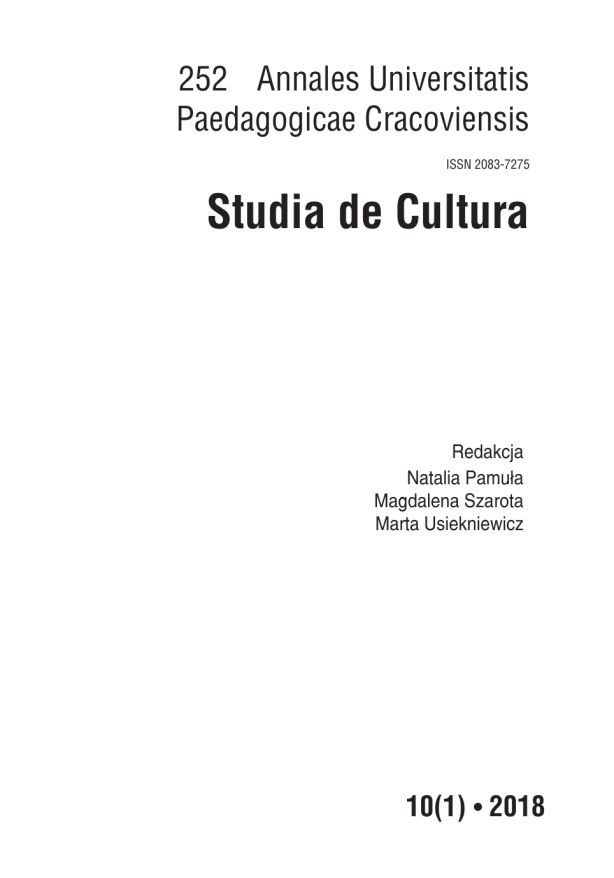Abstract
10.24917/20837275.10.1.6
W tekście przybliżam wybrane zagadnienia i problemy wyłaniające się przy próbie analizy pop/kulturowego dyskursu o seksualności osób niepełnosprawnych. W tym celu posługuję się szeregiem narzędzi metodologiczno-teoretycznych, takich jak: kulturowy model niepełnosprawności, analiza kulturowa, teoria krytyczna (critical theory) elementy etnografii i crip theory.
An introduction to cultural representations of disabled people’s sexuality
In the following article, I outline some of the issues and problems that one may encounter while attempting to analyse the pop/cultural representations of disabled people’s sexuality. Towards this end, I employ a variety of methodological and theoretical tools, such as e.g. cultural model of disability/cultural analysis, critical theory, elements of ethnographical research and crip theory.
References
Aktualności filmowe+. 2013. [program telewizyjny, 2.10.]. Canal+ film.
View in Google Scholar
Barnes C., Oliver, M. 2006. “Disability Politics: Where did it all go wrong?”. http://disability-studies.leeds.ac.uk/library/author/barnes.colin (dostęp: 12.04.2017).
View in Google Scholar
Bose S. 2014. “Margarita with a straw” [film]. Wolfe Releasing. https://www.netflix.com/watch/80018695?trackId=13752289&tctx=0%2C0%2C694336a5-c970-4c4e-828b-57f57f9ea7ca-3587353 (dostęp: 1.07.2017).
View in Google Scholar
Braidotti R. 2014. Po człowieku. Warszawa.
View in Google Scholar
Brewer J.D. 2003. Ethnography. W The A-Z of Social Research. R.L. Miller, J.D. Brewer (red.). London. 100–103.
View in Google Scholar
Bronner S.E. 2011. Critical Theory: A Very Short Introduction. New York.
View in Google Scholar
Burnet R. 2016. “Fundamentals of caring” [film]. Netflix. https://www.netflix.com/watch/ 80097349?trackId=13752289&tctx=0%2C0%2C1a1cd5baef2e0de4197eaed48207b-4b76ad64731%3A53b626c58c5a94ab692ed0e472a7a78271205d20 (dostęp: 2.07.2017).
View in Google Scholar
Clough G., Ferguson R. 2009. “Top 40 Potential Viva Questions”. http://www.open.ac.uk/blo-gs/ResearchEssentials/?p=156 (dostęp: 18.05.2017).
View in Google Scholar
Crow L. 1996. Including all of our lives: renewing the social model of disability. W Encounters with strangers: Feminism and Disability. J. Morris (red.). London. 206–226).
View in Google Scholar
Flemming I. 1958. Dr No. London.
View in Google Scholar
Goddard R., Payne M. 2013. “Criticality and the practice-based MA: an argument drawn from teaching on the Masters in Teaching and Learning (MTL)”. International Research and Pedagogy nr 39(1). 123–135. https://doi.org/10.1080/02607476.2012.733195 (dostęp: 18.05.2017).
View in Google Scholar
Goodley D. 2013. “Dis/entangling critical disability studies”. Disability & Society nr 28(5). 631–644. https://doi.org/10.1080/09687599.2012.717884 (dostęp: 18.05.2017).
View in Google Scholar
Goodley D. 2014. Dis/ability Studies: Theorising disablism and ableism. London.
View in Google Scholar
Goodley D. 2016. Disability Studies: An Interdisciplinary Introduction. London.
View in Google Scholar
Goodley D., Lawthom R. (red.). 2006. Disability and psychology: critical introductions and reflections. Basingstoke.
View in Google Scholar
Goodley D., Lawthom R., Runswick-Cole K. 2014. “Posthuman disability studies”. Subjectivity nr 7(4). 342–361.
View in Google Scholar
Goodley D., Mackiewicz M. (b.d.). Critical disability studies: sketches from the UK and Poland. [niepublikowany manuskrypt].
View in Google Scholar
Higgins K. 2015. “Dear Able Friends, I Am Not Your Inspiration Porn”. http://www.huffingtonpost.com/karrie-higgins/not-your-inspiration-porn_b_8172842.html (dostęp: 15.10. 2015).
View in Google Scholar
Izdebski Z. 2014. O potrzebie całożyciowej edukacji seksualnej. Zaprezentowano na „Oblicza seksualności osób niepełnosprawnych – wątki rozproszone w pedagogice specjalnej” – październik. Kraków.
View in Google Scholar
Lewin B. 2012. The sessions. [film] Fox.
View in Google Scholar
Lewis V.A. 2015. Crip. W Keywords for disability studies. R. Adams, B. Reiss, D. Serlin (red.). New York. 46–48.
View in Google Scholar
Mackiewicz M. 2013. Disability as odd: a quasi-autobiographical cultural analysis [niepublikowana praca magisterska]. University of Sheffield.
View in Google Scholar
Martinez F. 2014. What the **** is normal?! London.
View in Google Scholar
McRuer R. 2003. “As Good As It Gets: Queer Theory and Critical Disability”. GLQ: A Journal of Lesbian and Gay Studies nr 9(1). 79–105.
View in Google Scholar
McRuer R. 2006. Crip theory: Cultural signs of queerness and disability. New York.
View in Google Scholar
Mitchell D.T., Snyder, S.L. 2000. Narrative prosthesis: Disability and the dependencies of discourse. Ann Arbor, University of Michigan.
View in Google Scholar
Morris J. (red.). 1989. Able lives: Women’s experience of paralysis. London.
View in Google Scholar
Morris J. (red.). 1996. Encounters with strangers: Feminism and Disability. London.
View in Google Scholar
Nie-pelnosprawni.pl. 2013. „Seksterapeutki w Polsce? «Rozpętałaby się religijno-polityczna burza»”. http://www.nie-pelnosprawni.pl/index.php/ludzie-i-wydarzenia/sex-niepenosprawnych/3818-seksterapeutki-w-polsce-rozpetalaby-sie-religijno-polityczna-burza?jsn_mobilize_preview=1?jsn_mobilize_preview=1 (dostęp: 15.05.2017).
View in Google Scholar
O’Brien M. 1990. “On Seeing A Sex Surrogate”. The Sun Magazine nr 174. 1–7.
View in Google Scholar
Oliver M. 1990. The politics of disablement. London.
View in Google Scholar
Oliver M. 1996. Understanding disability: from theory to practice. Basingstoke.
View in Google Scholar
Overboe J. 2007. “Disability and Genetics: Affirming the Bare Life (the State of Exception)”. The Canadian Review of Sociology and Anthropology nr 44(2). 219–235.
View in Google Scholar
Perry D.M. 2015. “Inspiration porn further disables the disabled”. http://america.aljazeera.com/opinions/2015/6/inspiration-porn-further-disables-the-disabled.html (dostęp: 15.10.2015).
View in Google Scholar
Pieprzyca M. 2013. Chce się żyć. [film] Kino Świat.
View in Google Scholar
Porter S. 2003. Critical theory. W The A-Z of Social Research. R.L. Miller, J.D. Brewer (red.). London. 58–61.
View in Google Scholar
Rozmowy w Toku. 2013. Czy kobieta na wózku może być pociągająca? [program telewizyjny] TVN.
View in Google Scholar
Runswick-Cole K. 2011. Ethnography. W P. Banister, G. Bunn, E. Burman i in., Qualitative methods in psychology: a research guide. Maidenhead. 75–87.
View in Google Scholar
Samuels E. 2015. Passing. W Keywords for disability studies. R. Adams, B. Reiss, D. Serlin (red.). New York. 135–137.
View in Google Scholar
Skalski R. 2010. Kochankowie [dokument telewizyjny]. Krakowska Fundacja Filmowa.
View in Google Scholar
Snyder S.L., Mitchell D.T. 2006. Cultural locations of disability. Chicago.
View in Google Scholar
Swain J., French S., Barnes C., Thomas, C. (red.). 2014. Disabling Barriers – Enabling Environments. London.
View in Google Scholar
Szostkiewicz A. 2013. „Czyje jest ciało?”. Polityka nr 40. 12–14.
View in Google Scholar
Thomas C. 2007. Sociologies of disability and illness: contested ideas in disability studies and medical sociology. Basingstoke.
View in Google Scholar
Tok FM. 2013. „Seksterapeutki w Polsce? «Rozpętałaby się religijno-polityczna burza»”. http://www.tokfm.pl/Tokfm/1,102433,13274409,Seksterapeutki_w_Polsce___Rozpeta-laby_sie_religijno_polityczna.html (dostęp: 11.07.2014).
View in Google Scholar
Young S. 2014. “I’m not your inspiration, thank you very much”. https://www.youtube.com/watch?v=8K9Gg164Bsw (dostęp: 2.06.2017).
View in Google Scholar

